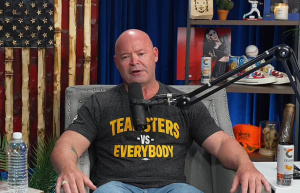Teamsters President Sean O'Brien has publicly condemned the Democratic Party for failing to represent working-class Americans. This marks a significant shift as the powerful union withholds its traditional Democratic endorsement amid growing discontent.
Growing Rift: Teamsters Union Leader Criticizes Democratic Party

Growing Rift: Teamsters Union Leader Criticizes Democratic Party
Highlighting discontent, Teamsters President Sean O'Brien condemns Democrats, accusing them of neglecting working-class roots.
In an striking critique, Teamsters union president Sean O'Brien has voiced his disillusionment with the Democratic Party, accusing them of neglecting the needs of working-class Americans. O'Brien's comments were made following the union's decision not to endorse Kamala Harris, the Democratic candidate for the 2024 presidential election. This marks a historic first since 1996, reflecting a broader sentiment within labor ranks that have traditionally aligned with Democrats.
O'Brien's criticisms were expressed on Theo Von’s podcast, where he highlighted the disconnect between Democrats and their traditional labor support. He accused the party of being overly influenced by corporate interests, particularly in the tech sector. Internal union polling supports O’Brien’s perspective, revealing that a notable majority of Teamsters members favor Republican Donald Trump over Harris.
The decision not to endorse Harris is a significant setback and raises alarms within the Democratic establishment about the party’s ability to engage working-class voters. While the union refrained from endorsing either candidate this election, financial contributions indicate continued Democratic support, with substantial donations flowing to Democratic causes under O'Brien's leadership despite his criticisms.
O'Brien emphasized his dissatisfaction is directed at the party's systemic issues rather than union members' choices. The union leader suggested Republicans could capitalize on this opportunity to align more closely with working-class interests. This shift poses a new challenge for Harris's campaign, which must reconcile and rebuild ties with labor unions essential for securing key voter blocs.
O'Brien's criticisms were expressed on Theo Von’s podcast, where he highlighted the disconnect between Democrats and their traditional labor support. He accused the party of being overly influenced by corporate interests, particularly in the tech sector. Internal union polling supports O’Brien’s perspective, revealing that a notable majority of Teamsters members favor Republican Donald Trump over Harris.
The decision not to endorse Harris is a significant setback and raises alarms within the Democratic establishment about the party’s ability to engage working-class voters. While the union refrained from endorsing either candidate this election, financial contributions indicate continued Democratic support, with substantial donations flowing to Democratic causes under O'Brien's leadership despite his criticisms.
O'Brien emphasized his dissatisfaction is directed at the party's systemic issues rather than union members' choices. The union leader suggested Republicans could capitalize on this opportunity to align more closely with working-class interests. This shift poses a new challenge for Harris's campaign, which must reconcile and rebuild ties with labor unions essential for securing key voter blocs.




















